Advanced Global Financial Management (P30899) EMH Report, 2020
VerifiedAdded on 2022/08/14
|11
|2834
|16
Report
AI Summary
This report provides a comprehensive analysis of the Efficient Market Hypothesis (EMH), a cornerstone of financial economics. It begins with an introduction to the EMH, explaining its core principles, which suggest that asset prices reflect all available information. The report then delves into a literature review, exploring the EMH in detail, including its three forms: weak, semi-strong, and strong. The main body of the report critically examines the EMH's ability to explain asset pricing, particularly concerning a firm's debt and equity, and discusses the relevance of the EMH to corporate managers. The analysis considers the implications of EMH on mergers and acquisitions, creative accounting, financial policy timing, and project evaluation based on Net Present Value (NPV). The report concludes by summarizing the EMH's role in describing the relationship between information and security prices, emphasizing its implications for investment decisions and market efficiency.
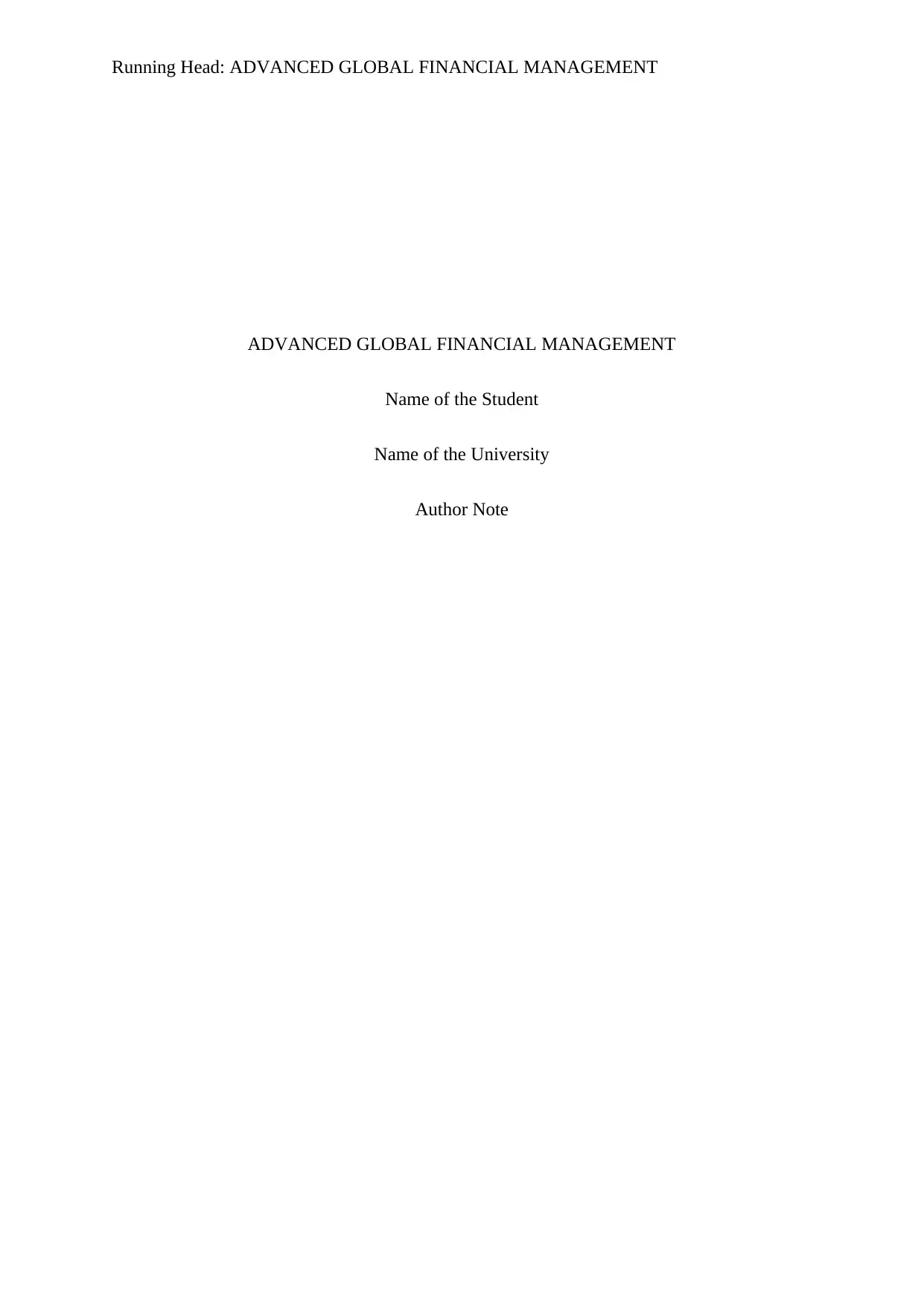
Running Head: ADVANCED GLOBAL FINANCIAL MANAGEMENT
ADVANCED GLOBAL FINANCIAL MANAGEMENT
Name of the Student
Name of the University
Author Note
ADVANCED GLOBAL FINANCIAL MANAGEMENT
Name of the Student
Name of the University
Author Note
Paraphrase This Document
Need a fresh take? Get an instant paraphrase of this document with our AI Paraphraser

1ADVANCED GLOBAL FINANCIAL MANAGEMENT
Table of Contents
Introduction................................................................................................................................2
Literature Review.......................................................................................................................2
Efficient Market Hypothesis..................................................................................................2
Relevance of EMH.................................................................................................................5
Conclusion..................................................................................................................................7
Reference....................................................................................................................................9
Table of Contents
Introduction................................................................................................................................2
Literature Review.......................................................................................................................2
Efficient Market Hypothesis..................................................................................................2
Relevance of EMH.................................................................................................................5
Conclusion..................................................................................................................................7
Reference....................................................................................................................................9
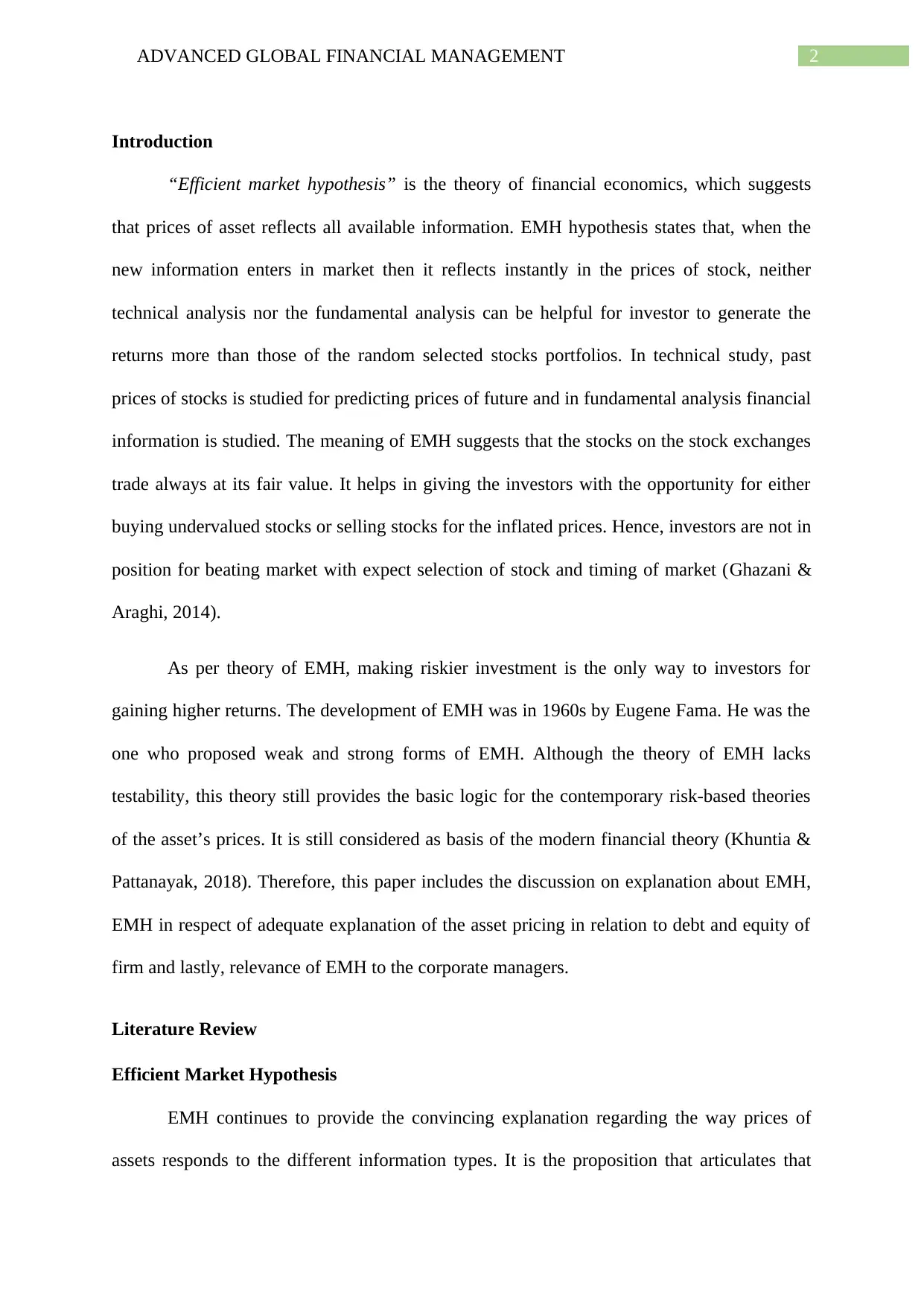
2ADVANCED GLOBAL FINANCIAL MANAGEMENT
Introduction
“Efficient market hypothesis” is the theory of financial economics, which suggests
that prices of asset reflects all available information. EMH hypothesis states that, when the
new information enters in market then it reflects instantly in the prices of stock, neither
technical analysis nor the fundamental analysis can be helpful for investor to generate the
returns more than those of the random selected stocks portfolios. In technical study, past
prices of stocks is studied for predicting prices of future and in fundamental analysis financial
information is studied. The meaning of EMH suggests that the stocks on the stock exchanges
trade always at its fair value. It helps in giving the investors with the opportunity for either
buying undervalued stocks or selling stocks for the inflated prices. Hence, investors are not in
position for beating market with expect selection of stock and timing of market (Ghazani &
Araghi, 2014).
As per theory of EMH, making riskier investment is the only way to investors for
gaining higher returns. The development of EMH was in 1960s by Eugene Fama. He was the
one who proposed weak and strong forms of EMH. Although the theory of EMH lacks
testability, this theory still provides the basic logic for the contemporary risk-based theories
of the asset’s prices. It is still considered as basis of the modern financial theory (Khuntia &
Pattanayak, 2018). Therefore, this paper includes the discussion on explanation about EMH,
EMH in respect of adequate explanation of the asset pricing in relation to debt and equity of
firm and lastly, relevance of EMH to the corporate managers.
Literature Review
Efficient Market Hypothesis
EMH continues to provide the convincing explanation regarding the way prices of
assets responds to the different information types. It is the proposition that articulates that
Introduction
“Efficient market hypothesis” is the theory of financial economics, which suggests
that prices of asset reflects all available information. EMH hypothesis states that, when the
new information enters in market then it reflects instantly in the prices of stock, neither
technical analysis nor the fundamental analysis can be helpful for investor to generate the
returns more than those of the random selected stocks portfolios. In technical study, past
prices of stocks is studied for predicting prices of future and in fundamental analysis financial
information is studied. The meaning of EMH suggests that the stocks on the stock exchanges
trade always at its fair value. It helps in giving the investors with the opportunity for either
buying undervalued stocks or selling stocks for the inflated prices. Hence, investors are not in
position for beating market with expect selection of stock and timing of market (Ghazani &
Araghi, 2014).
As per theory of EMH, making riskier investment is the only way to investors for
gaining higher returns. The development of EMH was in 1960s by Eugene Fama. He was the
one who proposed weak and strong forms of EMH. Although the theory of EMH lacks
testability, this theory still provides the basic logic for the contemporary risk-based theories
of the asset’s prices. It is still considered as basis of the modern financial theory (Khuntia &
Pattanayak, 2018). Therefore, this paper includes the discussion on explanation about EMH,
EMH in respect of adequate explanation of the asset pricing in relation to debt and equity of
firm and lastly, relevance of EMH to the corporate managers.
Literature Review
Efficient Market Hypothesis
EMH continues to provide the convincing explanation regarding the way prices of
assets responds to the different information types. It is the proposition that articulates that
⊘ This is a preview!⊘
Do you want full access?
Subscribe today to unlock all pages.

Trusted by 1+ million students worldwide
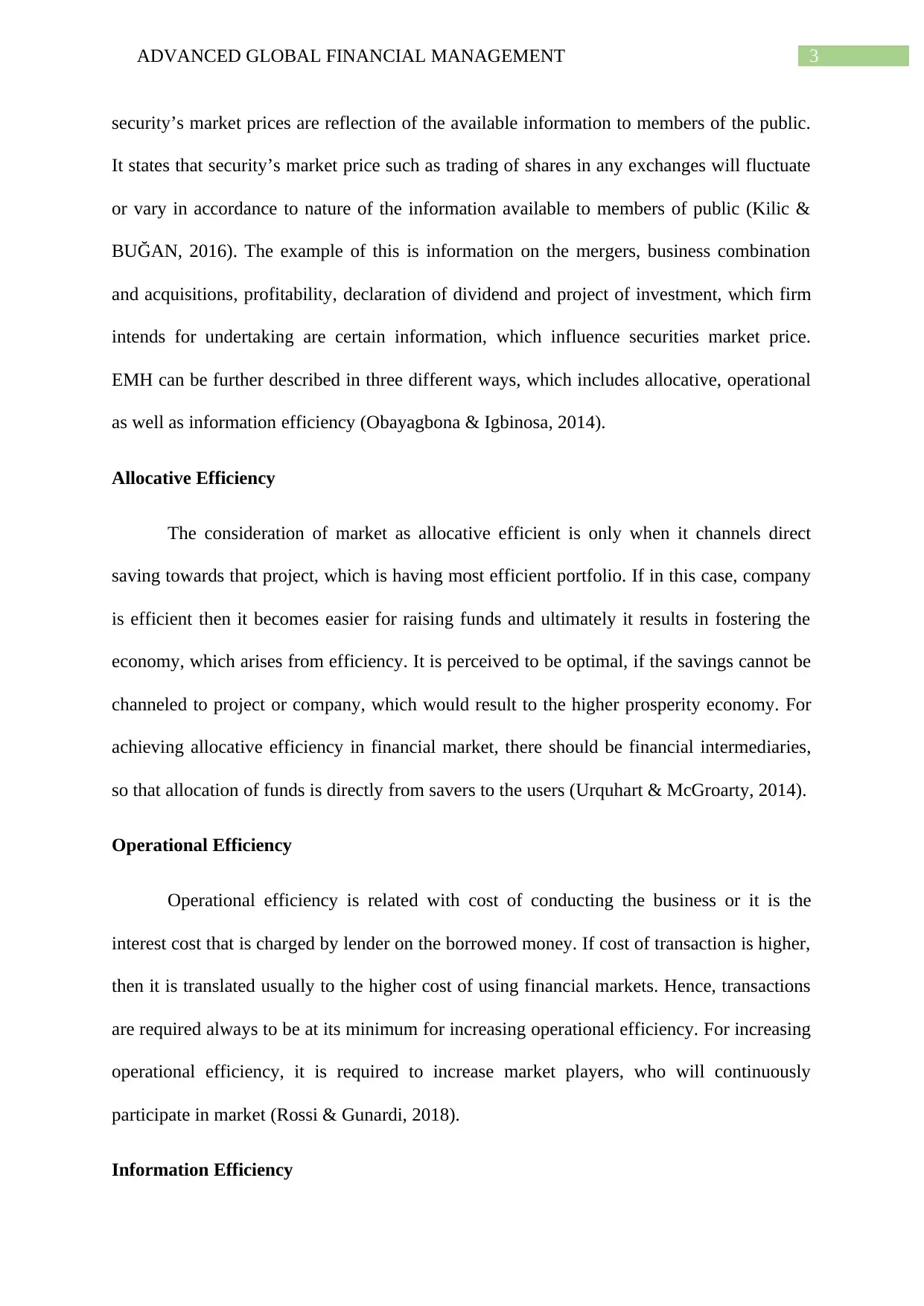
3ADVANCED GLOBAL FINANCIAL MANAGEMENT
security’s market prices are reflection of the available information to members of the public.
It states that security’s market price such as trading of shares in any exchanges will fluctuate
or vary in accordance to nature of the information available to members of public (Kilic &
BUĞAN, 2016). The example of this is information on the mergers, business combination
and acquisitions, profitability, declaration of dividend and project of investment, which firm
intends for undertaking are certain information, which influence securities market price.
EMH can be further described in three different ways, which includes allocative, operational
as well as information efficiency (Obayagbona & Igbinosa, 2014).
Allocative Efficiency
The consideration of market as allocative efficient is only when it channels direct
saving towards that project, which is having most efficient portfolio. If in this case, company
is efficient then it becomes easier for raising funds and ultimately it results in fostering the
economy, which arises from efficiency. It is perceived to be optimal, if the savings cannot be
channeled to project or company, which would result to the higher prosperity economy. For
achieving allocative efficiency in financial market, there should be financial intermediaries,
so that allocation of funds is directly from savers to the users (Urquhart & McGroarty, 2014).
Operational Efficiency
Operational efficiency is related with cost of conducting the business or it is the
interest cost that is charged by lender on the borrowed money. If cost of transaction is higher,
then it is translated usually to the higher cost of using financial markets. Hence, transactions
are required always to be at its minimum for increasing operational efficiency. For increasing
operational efficiency, it is required to increase market players, who will continuously
participate in market (Rossi & Gunardi, 2018).
Information Efficiency
security’s market prices are reflection of the available information to members of the public.
It states that security’s market price such as trading of shares in any exchanges will fluctuate
or vary in accordance to nature of the information available to members of public (Kilic &
BUĞAN, 2016). The example of this is information on the mergers, business combination
and acquisitions, profitability, declaration of dividend and project of investment, which firm
intends for undertaking are certain information, which influence securities market price.
EMH can be further described in three different ways, which includes allocative, operational
as well as information efficiency (Obayagbona & Igbinosa, 2014).
Allocative Efficiency
The consideration of market as allocative efficient is only when it channels direct
saving towards that project, which is having most efficient portfolio. If in this case, company
is efficient then it becomes easier for raising funds and ultimately it results in fostering the
economy, which arises from efficiency. It is perceived to be optimal, if the savings cannot be
channeled to project or company, which would result to the higher prosperity economy. For
achieving allocative efficiency in financial market, there should be financial intermediaries,
so that allocation of funds is directly from savers to the users (Urquhart & McGroarty, 2014).
Operational Efficiency
Operational efficiency is related with cost of conducting the business or it is the
interest cost that is charged by lender on the borrowed money. If cost of transaction is higher,
then it is translated usually to the higher cost of using financial markets. Hence, transactions
are required always to be at its minimum for increasing operational efficiency. For increasing
operational efficiency, it is required to increase market players, who will continuously
participate in market (Rossi & Gunardi, 2018).
Information Efficiency
Paraphrase This Document
Need a fresh take? Get an instant paraphrase of this document with our AI Paraphraser
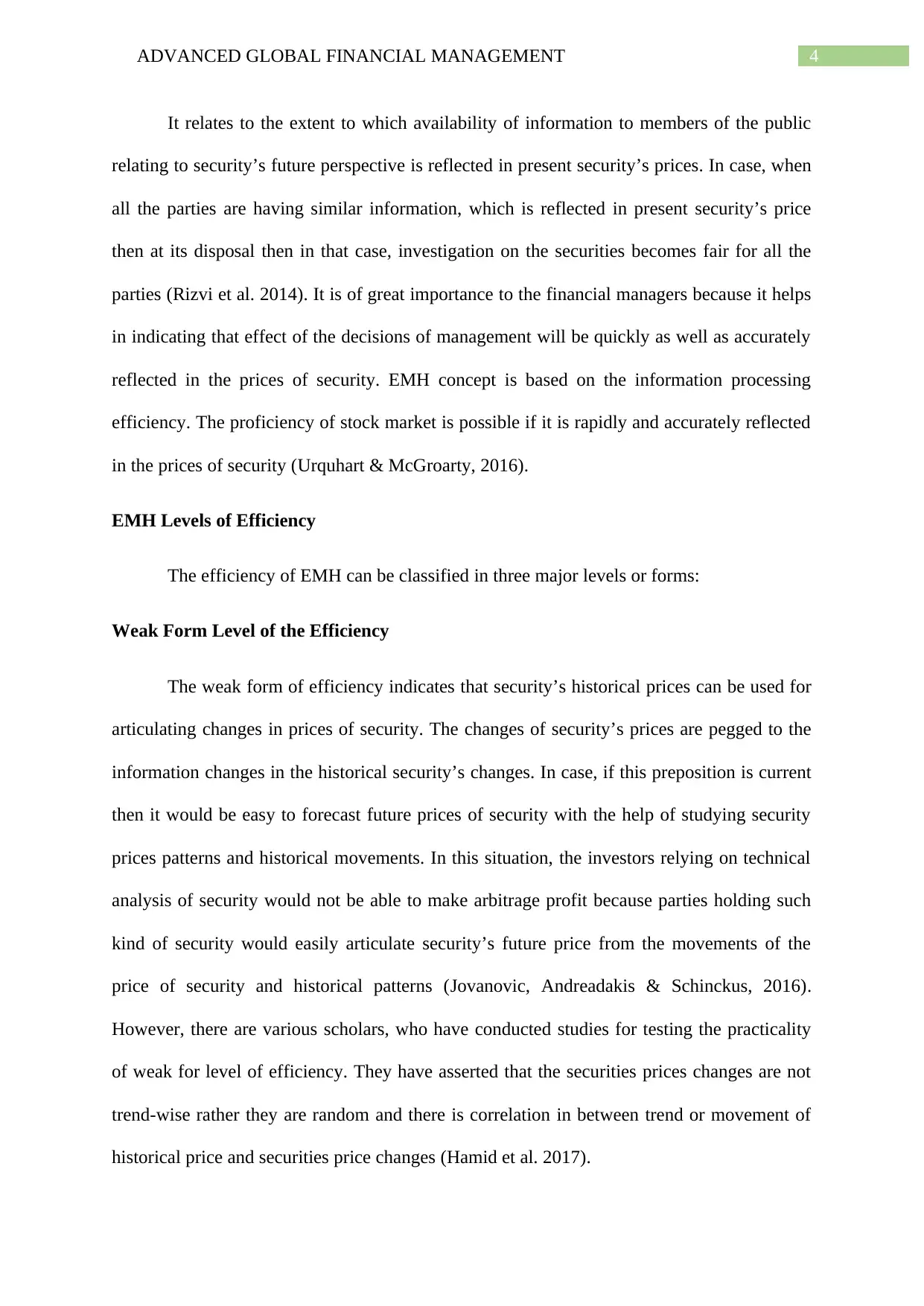
4ADVANCED GLOBAL FINANCIAL MANAGEMENT
It relates to the extent to which availability of information to members of the public
relating to security’s future perspective is reflected in present security’s prices. In case, when
all the parties are having similar information, which is reflected in present security’s price
then at its disposal then in that case, investigation on the securities becomes fair for all the
parties (Rizvi et al. 2014). It is of great importance to the financial managers because it helps
in indicating that effect of the decisions of management will be quickly as well as accurately
reflected in the prices of security. EMH concept is based on the information processing
efficiency. The proficiency of stock market is possible if it is rapidly and accurately reflected
in the prices of security (Urquhart & McGroarty, 2016).
EMH Levels of Efficiency
The efficiency of EMH can be classified in three major levels or forms:
Weak Form Level of the Efficiency
The weak form of efficiency indicates that security’s historical prices can be used for
articulating changes in prices of security. The changes of security’s prices are pegged to the
information changes in the historical security’s changes. In case, if this preposition is current
then it would be easy to forecast future prices of security with the help of studying security
prices patterns and historical movements. In this situation, the investors relying on technical
analysis of security would not be able to make arbitrage profit because parties holding such
kind of security would easily articulate security’s future price from the movements of the
price of security and historical patterns (Jovanovic, Andreadakis & Schinckus, 2016).
However, there are various scholars, who have conducted studies for testing the practicality
of weak for level of efficiency. They have asserted that the securities prices changes are not
trend-wise rather they are random and there is correlation in between trend or movement of
historical price and securities price changes (Hamid et al. 2017).
It relates to the extent to which availability of information to members of the public
relating to security’s future perspective is reflected in present security’s prices. In case, when
all the parties are having similar information, which is reflected in present security’s price
then at its disposal then in that case, investigation on the securities becomes fair for all the
parties (Rizvi et al. 2014). It is of great importance to the financial managers because it helps
in indicating that effect of the decisions of management will be quickly as well as accurately
reflected in the prices of security. EMH concept is based on the information processing
efficiency. The proficiency of stock market is possible if it is rapidly and accurately reflected
in the prices of security (Urquhart & McGroarty, 2016).
EMH Levels of Efficiency
The efficiency of EMH can be classified in three major levels or forms:
Weak Form Level of the Efficiency
The weak form of efficiency indicates that security’s historical prices can be used for
articulating changes in prices of security. The changes of security’s prices are pegged to the
information changes in the historical security’s changes. In case, if this preposition is current
then it would be easy to forecast future prices of security with the help of studying security
prices patterns and historical movements. In this situation, the investors relying on technical
analysis of security would not be able to make arbitrage profit because parties holding such
kind of security would easily articulate security’s future price from the movements of the
price of security and historical patterns (Jovanovic, Andreadakis & Schinckus, 2016).
However, there are various scholars, who have conducted studies for testing the practicality
of weak for level of efficiency. They have asserted that the securities prices changes are not
trend-wise rather they are random and there is correlation in between trend or movement of
historical price and securities price changes (Hamid et al. 2017).
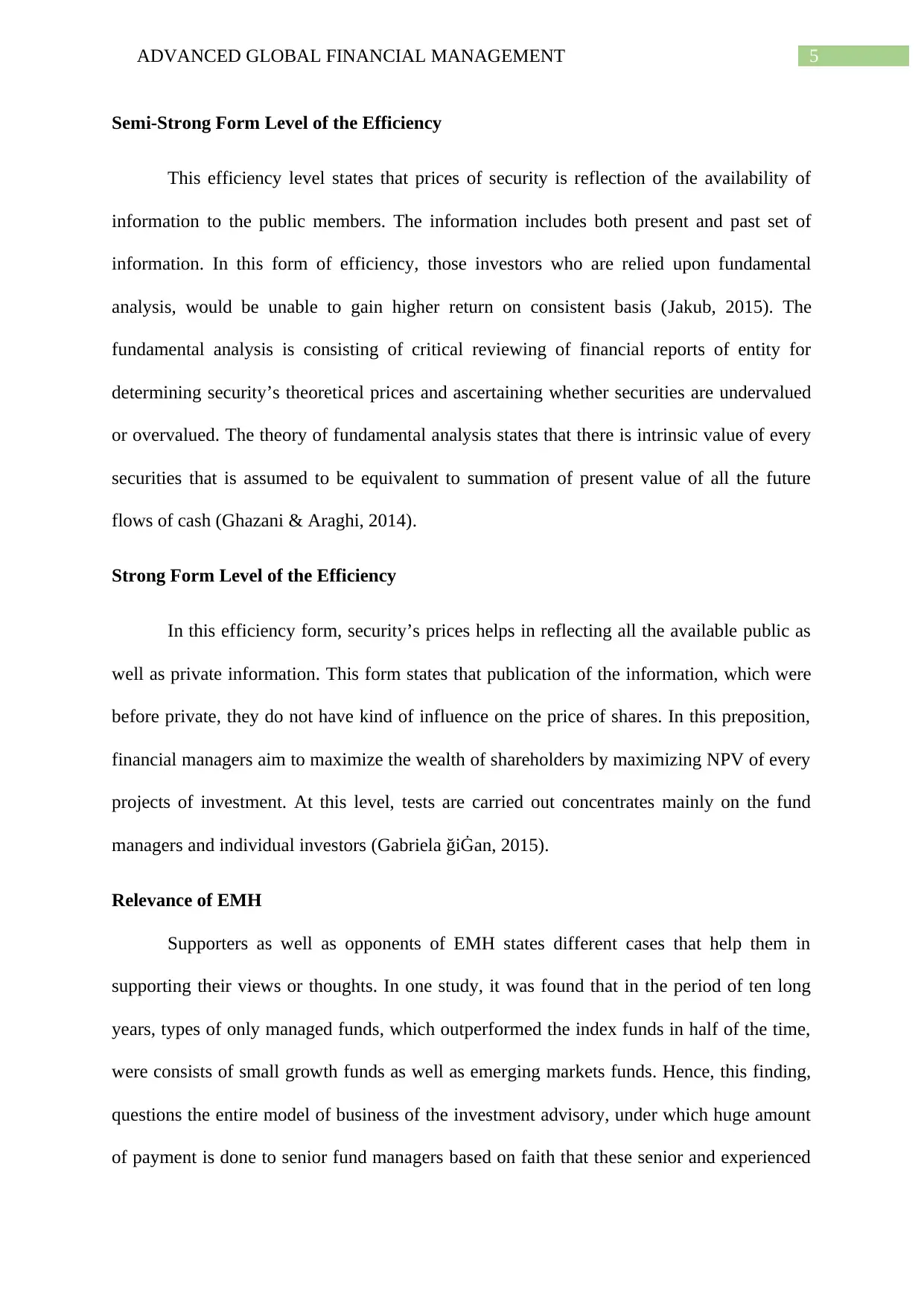
5ADVANCED GLOBAL FINANCIAL MANAGEMENT
Semi-Strong Form Level of the Efficiency
This efficiency level states that prices of security is reflection of the availability of
information to the public members. The information includes both present and past set of
information. In this form of efficiency, those investors who are relied upon fundamental
analysis, would be unable to gain higher return on consistent basis (Jakub, 2015). The
fundamental analysis is consisting of critical reviewing of financial reports of entity for
determining security’s theoretical prices and ascertaining whether securities are undervalued
or overvalued. The theory of fundamental analysis states that there is intrinsic value of every
securities that is assumed to be equivalent to summation of present value of all the future
flows of cash (Ghazani & Araghi, 2014).
Strong Form Level of the Efficiency
In this efficiency form, security’s prices helps in reflecting all the available public as
well as private information. This form states that publication of the information, which were
before private, they do not have kind of influence on the price of shares. In this preposition,
financial managers aim to maximize the wealth of shareholders by maximizing NPV of every
projects of investment. At this level, tests are carried out concentrates mainly on the fund
managers and individual investors (Gabriela ğiĠan, 2015).
Relevance of EMH
Supporters as well as opponents of EMH states different cases that help them in
supporting their views or thoughts. In one study, it was found that in the period of ten long
years, types of only managed funds, which outperformed the index funds in half of the time,
were consists of small growth funds as well as emerging markets funds. Hence, this finding,
questions the entire model of business of the investment advisory, under which huge amount
of payment is done to senior fund managers based on faith that these senior and experienced
Semi-Strong Form Level of the Efficiency
This efficiency level states that prices of security is reflection of the availability of
information to the public members. The information includes both present and past set of
information. In this form of efficiency, those investors who are relied upon fundamental
analysis, would be unable to gain higher return on consistent basis (Jakub, 2015). The
fundamental analysis is consisting of critical reviewing of financial reports of entity for
determining security’s theoretical prices and ascertaining whether securities are undervalued
or overvalued. The theory of fundamental analysis states that there is intrinsic value of every
securities that is assumed to be equivalent to summation of present value of all the future
flows of cash (Ghazani & Araghi, 2014).
Strong Form Level of the Efficiency
In this efficiency form, security’s prices helps in reflecting all the available public as
well as private information. This form states that publication of the information, which were
before private, they do not have kind of influence on the price of shares. In this preposition,
financial managers aim to maximize the wealth of shareholders by maximizing NPV of every
projects of investment. At this level, tests are carried out concentrates mainly on the fund
managers and individual investors (Gabriela ğiĠan, 2015).
Relevance of EMH
Supporters as well as opponents of EMH states different cases that help them in
supporting their views or thoughts. In one study, it was found that in the period of ten long
years, types of only managed funds, which outperformed the index funds in half of the time,
were consists of small growth funds as well as emerging markets funds. Hence, this finding,
questions the entire model of business of the investment advisory, under which huge amount
of payment is done to senior fund managers based on faith that these senior and experienced
⊘ This is a preview!⊘
Do you want full access?
Subscribe today to unlock all pages.

Trusted by 1+ million students worldwide
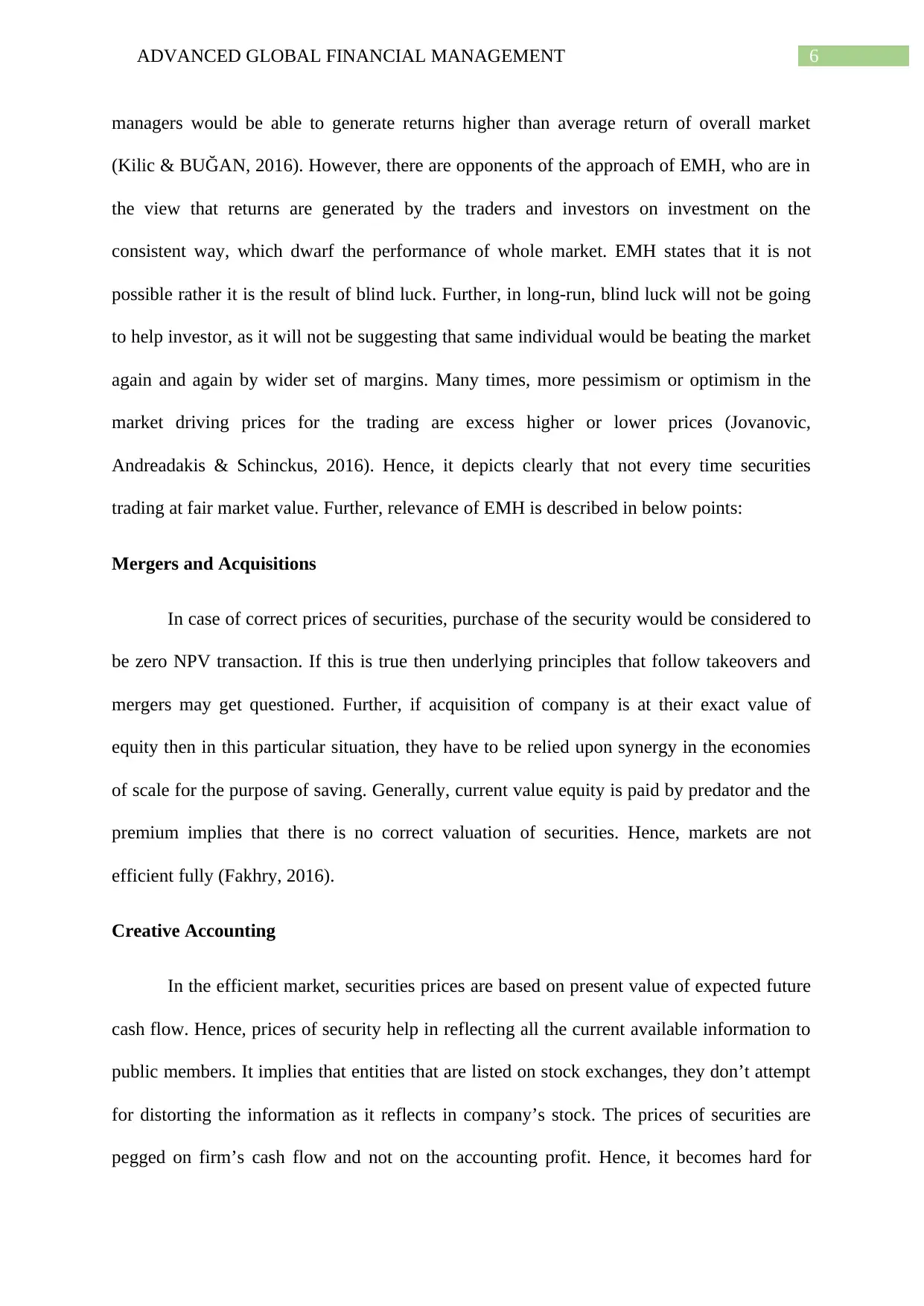
6ADVANCED GLOBAL FINANCIAL MANAGEMENT
managers would be able to generate returns higher than average return of overall market
(Kilic & BUĞAN, 2016). However, there are opponents of the approach of EMH, who are in
the view that returns are generated by the traders and investors on investment on the
consistent way, which dwarf the performance of whole market. EMH states that it is not
possible rather it is the result of blind luck. Further, in long-run, blind luck will not be going
to help investor, as it will not be suggesting that same individual would be beating the market
again and again by wider set of margins. Many times, more pessimism or optimism in the
market driving prices for the trading are excess higher or lower prices (Jovanovic,
Andreadakis & Schinckus, 2016). Hence, it depicts clearly that not every time securities
trading at fair market value. Further, relevance of EMH is described in below points:
Mergers and Acquisitions
In case of correct prices of securities, purchase of the security would be considered to
be zero NPV transaction. If this is true then underlying principles that follow takeovers and
mergers may get questioned. Further, if acquisition of company is at their exact value of
equity then in this particular situation, they have to be relied upon synergy in the economies
of scale for the purpose of saving. Generally, current value equity is paid by predator and the
premium implies that there is no correct valuation of securities. Hence, markets are not
efficient fully (Fakhry, 2016).
Creative Accounting
In the efficient market, securities prices are based on present value of expected future
cash flow. Hence, prices of security help in reflecting all the current available information to
public members. It implies that entities that are listed on stock exchanges, they don’t attempt
for distorting the information as it reflects in company’s stock. The prices of securities are
pegged on firm’s cash flow and not on the accounting profit. Hence, it becomes hard for
managers would be able to generate returns higher than average return of overall market
(Kilic & BUĞAN, 2016). However, there are opponents of the approach of EMH, who are in
the view that returns are generated by the traders and investors on investment on the
consistent way, which dwarf the performance of whole market. EMH states that it is not
possible rather it is the result of blind luck. Further, in long-run, blind luck will not be going
to help investor, as it will not be suggesting that same individual would be beating the market
again and again by wider set of margins. Many times, more pessimism or optimism in the
market driving prices for the trading are excess higher or lower prices (Jovanovic,
Andreadakis & Schinckus, 2016). Hence, it depicts clearly that not every time securities
trading at fair market value. Further, relevance of EMH is described in below points:
Mergers and Acquisitions
In case of correct prices of securities, purchase of the security would be considered to
be zero NPV transaction. If this is true then underlying principles that follow takeovers and
mergers may get questioned. Further, if acquisition of company is at their exact value of
equity then in this particular situation, they have to be relied upon synergy in the economies
of scale for the purpose of saving. Generally, current value equity is paid by predator and the
premium implies that there is no correct valuation of securities. Hence, markets are not
efficient fully (Fakhry, 2016).
Creative Accounting
In the efficient market, securities prices are based on present value of expected future
cash flow. Hence, prices of security help in reflecting all the current available information to
public members. It implies that entities that are listed on stock exchanges, they don’t attempt
for distorting the information as it reflects in company’s stock. The prices of securities are
pegged on firm’s cash flow and not on the accounting profit. Hence, it becomes hard for
Paraphrase This Document
Need a fresh take? Get an instant paraphrase of this document with our AI Paraphraser
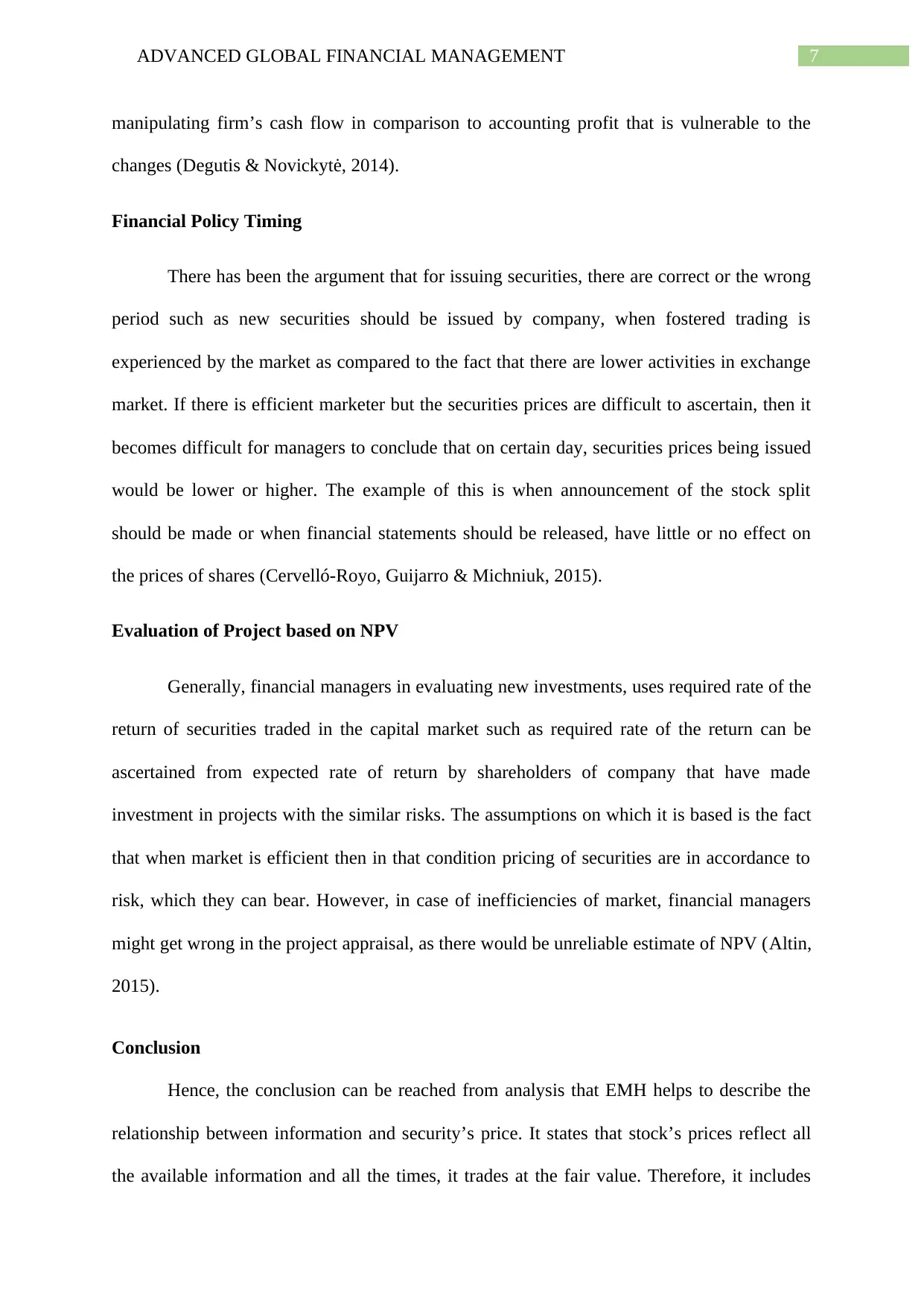
7ADVANCED GLOBAL FINANCIAL MANAGEMENT
manipulating firm’s cash flow in comparison to accounting profit that is vulnerable to the
changes (Degutis & Novickytė, 2014).
Financial Policy Timing
There has been the argument that for issuing securities, there are correct or the wrong
period such as new securities should be issued by company, when fostered trading is
experienced by the market as compared to the fact that there are lower activities in exchange
market. If there is efficient marketer but the securities prices are difficult to ascertain, then it
becomes difficult for managers to conclude that on certain day, securities prices being issued
would be lower or higher. The example of this is when announcement of the stock split
should be made or when financial statements should be released, have little or no effect on
the prices of shares (Cervelló-Royo, Guijarro & Michniuk, 2015).
Evaluation of Project based on NPV
Generally, financial managers in evaluating new investments, uses required rate of the
return of securities traded in the capital market such as required rate of the return can be
ascertained from expected rate of return by shareholders of company that have made
investment in projects with the similar risks. The assumptions on which it is based is the fact
that when market is efficient then in that condition pricing of securities are in accordance to
risk, which they can bear. However, in case of inefficiencies of market, financial managers
might get wrong in the project appraisal, as there would be unreliable estimate of NPV (Altin,
2015).
Conclusion
Hence, the conclusion can be reached from analysis that EMH helps to describe the
relationship between information and security’s price. It states that stock’s prices reflect all
the available information and all the times, it trades at the fair value. Therefore, it includes
manipulating firm’s cash flow in comparison to accounting profit that is vulnerable to the
changes (Degutis & Novickytė, 2014).
Financial Policy Timing
There has been the argument that for issuing securities, there are correct or the wrong
period such as new securities should be issued by company, when fostered trading is
experienced by the market as compared to the fact that there are lower activities in exchange
market. If there is efficient marketer but the securities prices are difficult to ascertain, then it
becomes difficult for managers to conclude that on certain day, securities prices being issued
would be lower or higher. The example of this is when announcement of the stock split
should be made or when financial statements should be released, have little or no effect on
the prices of shares (Cervelló-Royo, Guijarro & Michniuk, 2015).
Evaluation of Project based on NPV
Generally, financial managers in evaluating new investments, uses required rate of the
return of securities traded in the capital market such as required rate of the return can be
ascertained from expected rate of return by shareholders of company that have made
investment in projects with the similar risks. The assumptions on which it is based is the fact
that when market is efficient then in that condition pricing of securities are in accordance to
risk, which they can bear. However, in case of inefficiencies of market, financial managers
might get wrong in the project appraisal, as there would be unreliable estimate of NPV (Altin,
2015).
Conclusion
Hence, the conclusion can be reached from analysis that EMH helps to describe the
relationship between information and security’s price. It states that stock’s prices reflect all
the available information and all the times, it trades at the fair value. Therefore, it includes

8ADVANCED GLOBAL FINANCIAL MANAGEMENT
choice of stocks on consistent basis of those stocks that are able to beat return of the stock of
overall market. Moreover, the explanation has been done that regarding three forms of EMH,
which includes weak, semi and strong form. In addition, theory of EMH concludes that
trading of stocks is always at their value of fair market. Lastly, it can be said that it becomes
virtually quite impossible for buying either stocks that are undervalued or for extra income,
selling stocks that are overvalued.
choice of stocks on consistent basis of those stocks that are able to beat return of the stock of
overall market. Moreover, the explanation has been done that regarding three forms of EMH,
which includes weak, semi and strong form. In addition, theory of EMH concludes that
trading of stocks is always at their value of fair market. Lastly, it can be said that it becomes
virtually quite impossible for buying either stocks that are undervalued or for extra income,
selling stocks that are overvalued.
⊘ This is a preview!⊘
Do you want full access?
Subscribe today to unlock all pages.

Trusted by 1+ million students worldwide
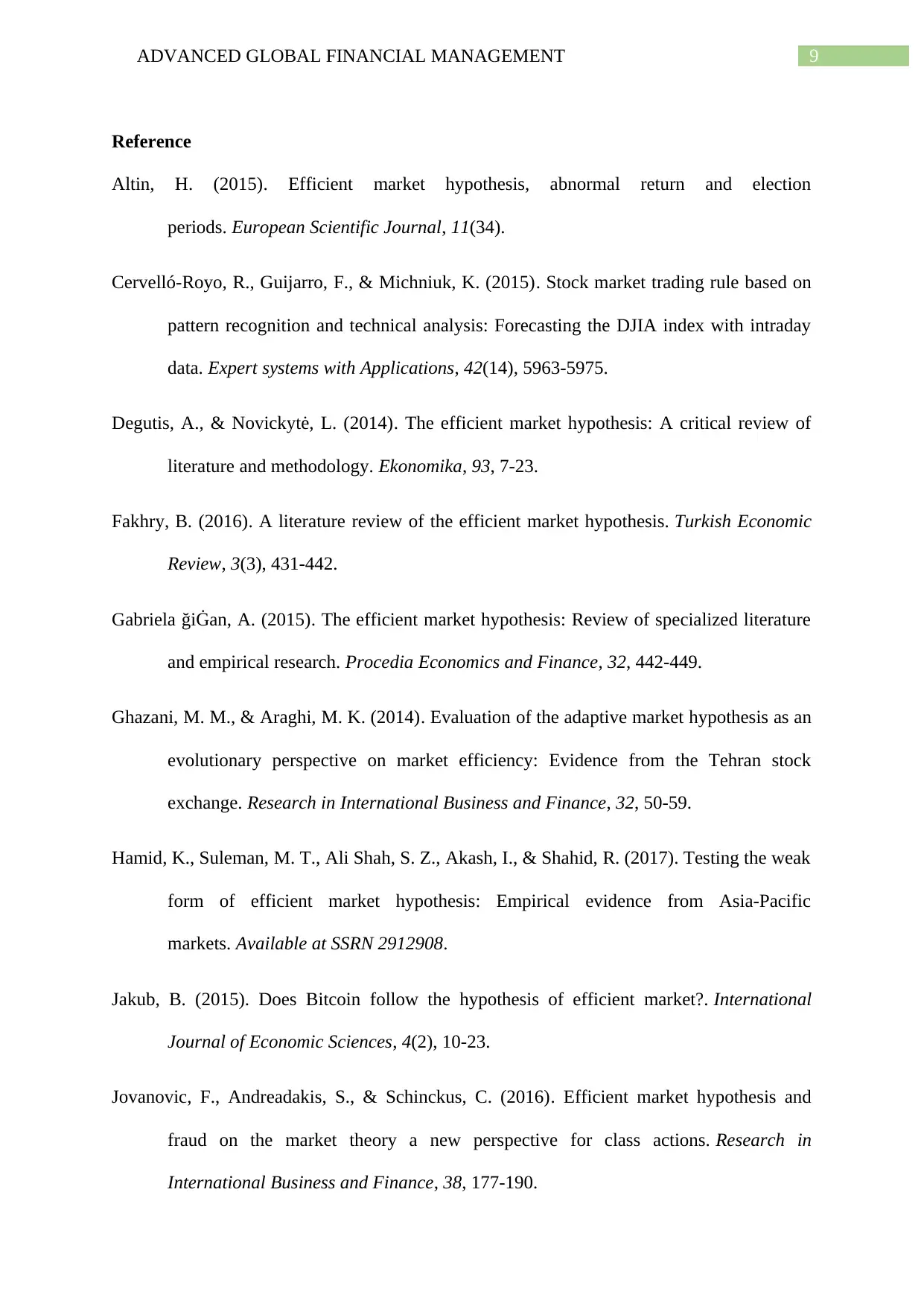
9ADVANCED GLOBAL FINANCIAL MANAGEMENT
Reference
Altin, H. (2015). Efficient market hypothesis, abnormal return and election
periods. European Scientific Journal, 11(34).
Cervelló-Royo, R., Guijarro, F., & Michniuk, K. (2015). Stock market trading rule based on
pattern recognition and technical analysis: Forecasting the DJIA index with intraday
data. Expert systems with Applications, 42(14), 5963-5975.
Degutis, A., & Novickytė, L. (2014). The efficient market hypothesis: A critical review of
literature and methodology. Ekonomika, 93, 7-23.
Fakhry, B. (2016). A literature review of the efficient market hypothesis. Turkish Economic
Review, 3(3), 431-442.
Gabriela ğiĠan, A. (2015). The efficient market hypothesis: Review of specialized literature
and empirical research. Procedia Economics and Finance, 32, 442-449.
Ghazani, M. M., & Araghi, M. K. (2014). Evaluation of the adaptive market hypothesis as an
evolutionary perspective on market efficiency: Evidence from the Tehran stock
exchange. Research in International Business and Finance, 32, 50-59.
Hamid, K., Suleman, M. T., Ali Shah, S. Z., Akash, I., & Shahid, R. (2017). Testing the weak
form of efficient market hypothesis: Empirical evidence from Asia-Pacific
markets. Available at SSRN 2912908.
Jakub, B. (2015). Does Bitcoin follow the hypothesis of efficient market?. International
Journal of Economic Sciences, 4(2), 10-23.
Jovanovic, F., Andreadakis, S., & Schinckus, C. (2016). Efficient market hypothesis and
fraud on the market theory a new perspective for class actions. Research in
International Business and Finance, 38, 177-190.
Reference
Altin, H. (2015). Efficient market hypothesis, abnormal return and election
periods. European Scientific Journal, 11(34).
Cervelló-Royo, R., Guijarro, F., & Michniuk, K. (2015). Stock market trading rule based on
pattern recognition and technical analysis: Forecasting the DJIA index with intraday
data. Expert systems with Applications, 42(14), 5963-5975.
Degutis, A., & Novickytė, L. (2014). The efficient market hypothesis: A critical review of
literature and methodology. Ekonomika, 93, 7-23.
Fakhry, B. (2016). A literature review of the efficient market hypothesis. Turkish Economic
Review, 3(3), 431-442.
Gabriela ğiĠan, A. (2015). The efficient market hypothesis: Review of specialized literature
and empirical research. Procedia Economics and Finance, 32, 442-449.
Ghazani, M. M., & Araghi, M. K. (2014). Evaluation of the adaptive market hypothesis as an
evolutionary perspective on market efficiency: Evidence from the Tehran stock
exchange. Research in International Business and Finance, 32, 50-59.
Hamid, K., Suleman, M. T., Ali Shah, S. Z., Akash, I., & Shahid, R. (2017). Testing the weak
form of efficient market hypothesis: Empirical evidence from Asia-Pacific
markets. Available at SSRN 2912908.
Jakub, B. (2015). Does Bitcoin follow the hypothesis of efficient market?. International
Journal of Economic Sciences, 4(2), 10-23.
Jovanovic, F., Andreadakis, S., & Schinckus, C. (2016). Efficient market hypothesis and
fraud on the market theory a new perspective for class actions. Research in
International Business and Finance, 38, 177-190.
Paraphrase This Document
Need a fresh take? Get an instant paraphrase of this document with our AI Paraphraser
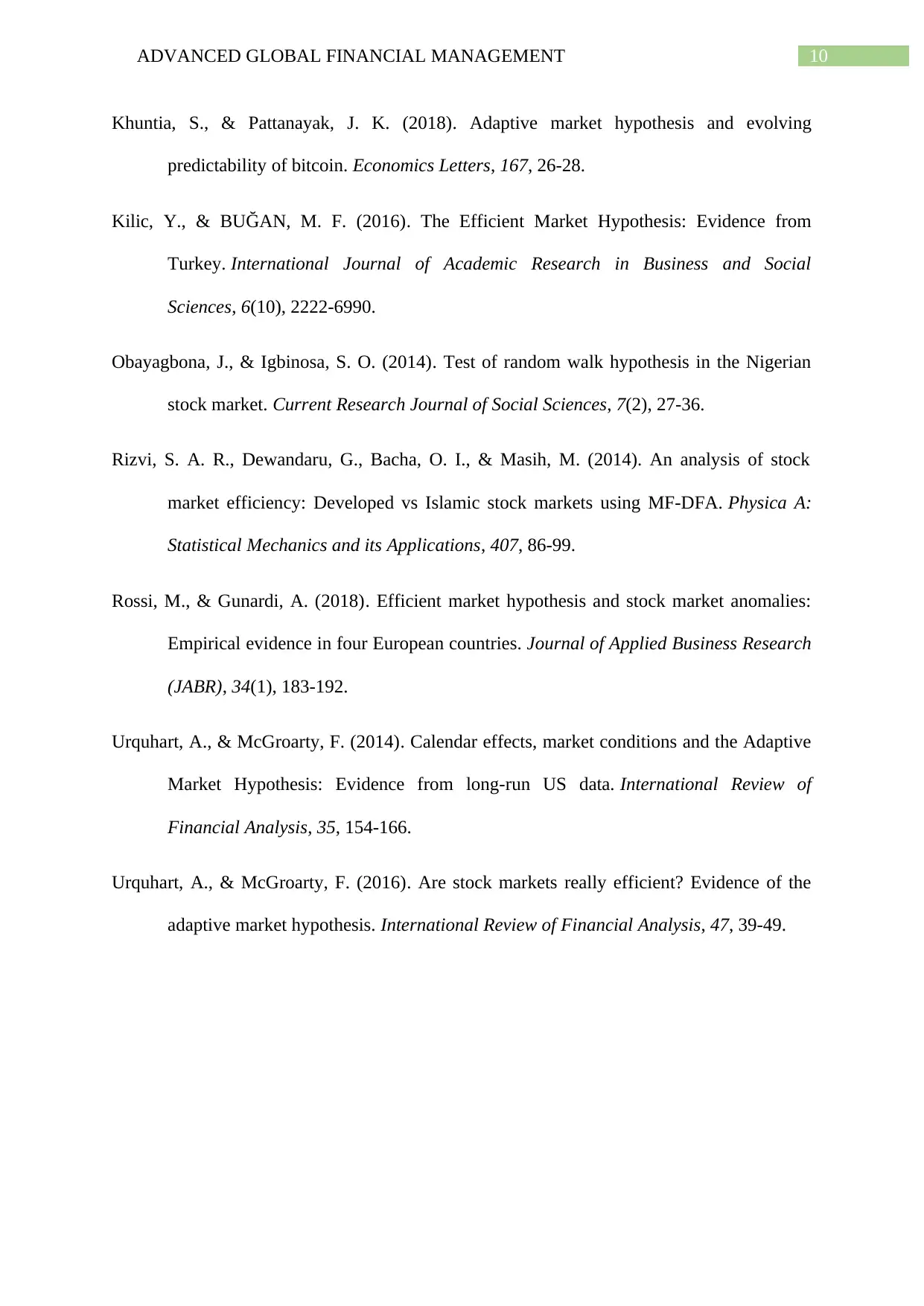
10ADVANCED GLOBAL FINANCIAL MANAGEMENT
Khuntia, S., & Pattanayak, J. K. (2018). Adaptive market hypothesis and evolving
predictability of bitcoin. Economics Letters, 167, 26-28.
Kilic, Y., & BUĞAN, M. F. (2016). The Efficient Market Hypothesis: Evidence from
Turkey. International Journal of Academic Research in Business and Social
Sciences, 6(10), 2222-6990.
Obayagbona, J., & Igbinosa, S. O. (2014). Test of random walk hypothesis in the Nigerian
stock market. Current Research Journal of Social Sciences, 7(2), 27-36.
Rizvi, S. A. R., Dewandaru, G., Bacha, O. I., & Masih, M. (2014). An analysis of stock
market efficiency: Developed vs Islamic stock markets using MF-DFA. Physica A:
Statistical Mechanics and its Applications, 407, 86-99.
Rossi, M., & Gunardi, A. (2018). Efficient market hypothesis and stock market anomalies:
Empirical evidence in four European countries. Journal of Applied Business Research
(JABR), 34(1), 183-192.
Urquhart, A., & McGroarty, F. (2014). Calendar effects, market conditions and the Adaptive
Market Hypothesis: Evidence from long-run US data. International Review of
Financial Analysis, 35, 154-166.
Urquhart, A., & McGroarty, F. (2016). Are stock markets really efficient? Evidence of the
adaptive market hypothesis. International Review of Financial Analysis, 47, 39-49.
Khuntia, S., & Pattanayak, J. K. (2018). Adaptive market hypothesis and evolving
predictability of bitcoin. Economics Letters, 167, 26-28.
Kilic, Y., & BUĞAN, M. F. (2016). The Efficient Market Hypothesis: Evidence from
Turkey. International Journal of Academic Research in Business and Social
Sciences, 6(10), 2222-6990.
Obayagbona, J., & Igbinosa, S. O. (2014). Test of random walk hypothesis in the Nigerian
stock market. Current Research Journal of Social Sciences, 7(2), 27-36.
Rizvi, S. A. R., Dewandaru, G., Bacha, O. I., & Masih, M. (2014). An analysis of stock
market efficiency: Developed vs Islamic stock markets using MF-DFA. Physica A:
Statistical Mechanics and its Applications, 407, 86-99.
Rossi, M., & Gunardi, A. (2018). Efficient market hypothesis and stock market anomalies:
Empirical evidence in four European countries. Journal of Applied Business Research
(JABR), 34(1), 183-192.
Urquhart, A., & McGroarty, F. (2014). Calendar effects, market conditions and the Adaptive
Market Hypothesis: Evidence from long-run US data. International Review of
Financial Analysis, 35, 154-166.
Urquhart, A., & McGroarty, F. (2016). Are stock markets really efficient? Evidence of the
adaptive market hypothesis. International Review of Financial Analysis, 47, 39-49.
1 out of 11
Related Documents
Your All-in-One AI-Powered Toolkit for Academic Success.
+13062052269
info@desklib.com
Available 24*7 on WhatsApp / Email
![[object Object]](/_next/static/media/star-bottom.7253800d.svg)
Unlock your academic potential
Copyright © 2020–2026 A2Z Services. All Rights Reserved. Developed and managed by ZUCOL.





